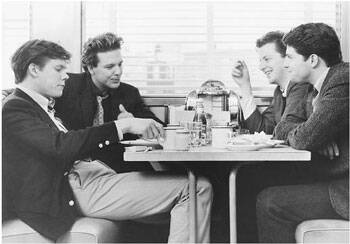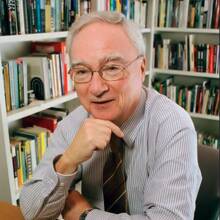In the past two decades social scientists have surely filled volumes to document the extent of the changes in American customs of sex, courtship and marriage. Even without statistical tables, it would be safe to maintain that our current film makers and novelists talk about sex so much and point out the contrast to earlier generations so sharply, that they are actually exaggerating the shift. My hunch is that every generation can look upon adolescence as a time of great tension between expectation and repression.
“Diner,” a modest but wise film written and directed by Barry Levinson, treats this tension with wit and sympathy. Set in Baltimore during the Christmas vacation of 1959, it explores the lives of a circle of friends in their early 20s. It miraculously avoids nasty satire—a genre brought to cliché by the current breed of Catholic authors and playwrights—and nostalgia. The diner is a staging area for the future. Around its formica tables, the friends plot their strategies for the conquest of women, business, education and money. They sally forth to challenge the world and then return to count casualties, discuss what went wrong and devise tactics for the next days assault. The diner is a refuge, the twilight of adolescence afraid of dawning into adulthood. They gather at night and separate as the rising sun paints the Baltimore waterfront a greenish gray.
The background music, like the junk food they consume at the diner—French fries with gravy—seems too childish for these almost-mature young men, but Levinson is saying that both they and perhaps the era they represent are still immature. The beat is vintage rock n roll, with sappy love phrases spiced with nonsense syllables, doo-wop-oo-oo. Fries and gravy for the ears.
Shrevie (Daniel Stern) is already married and works in an appliance store. By day he sells television sets and refrigerators to creeps, but at night he joins the conversation about dates and schemes at the diner. For him the fraternity is an escape from an adult life he is not ready to accept. When asked, he admits that marriage is "okay,” because he can get sex whenever he wants it, but he cannot talk to Beth, his wife, for more than five minutes. He can talk to his friends at the diner endlessly. His world is his record collection, more important to him than his wife—oo-wah-doo-wah.
Eddie (Steven Guttenberg) is about to marry, but he insists that his fiancée pass a football trivia quiz before the marriage. He will not make a mistake like Shrevies; he wants to be sure that he and his wife will have something to talk about after the marriage, even if it is only the Baltimore Colts. They finally wed, but the bridal march is replaced with the Colts fight song, and both the rabbi and the bridesmaids are dressed in the blue and white of the Colts.
Boogie (Mickey Rourke) has given up the obviously childish ways of his friends, but he is still groping toward maturity. He works in a beauty parlor by day and claims that he attends law school at night. He is obsessed with the challenge of women, but he cannot even dream of a lasting relationship. He runs up a gambling debt with the mob, which becomes a matter of life and death for him. His interests converge, when he switches his betting from sports to sexual conquests. He uses women cynically, but in his effort to win a bet, he discovers real compassion.
Saddest of all the gang at the diner is Fenwick (Kevin Bacon), a rich drop-out from college, determined to destroy himself with alcohol, his sports car or any combination of the two. After trying to raise money for Boogie, he goes on a drunken escapade and climbs into a churchyard manger to replace a stolen Christ child. When three of his friends come to take him home, he smashes their surrogates, the three plaster wise men, and finally wrecks the entire crèche. When the three friends are released on bail the next morning, Fenwick is left behind in jail. Others he saved, himself he is unable to save. He is a terminal adolescent.
By contrast, Billy (Timothy Daly) is a graduate student in business administration. He returns to the neighborhood for the holidays, resolved to marry the girl who has conceived his child. She, however, has career plans and wants no part of marriage at the present. He wants desperately to be an adult, but on his own terms, and these are unlikely to be met in the real world.
The film ends in a banquet hall at Eddies wedding reception. The setting marks a transition from the diner, but it is doubtful the friends are yet emotionally able to leave the fries and formica of the past. The wedding takes place on New Years eve. In a few hours the 1960s will crash into their world. How will they manage? How did anyone? This is a film of many questions and few answers, whose story unfolds with delicacy and sensitivity. The interplay of characters is almost perfect, leaving the impression that no matter what the future brings, the crowd at the diner will have the strength, if not to triumph, at least to survive.








